
I was watching Anvil: The Story of Anvil on VH1 Classic the other night, and I believe it was Slash who said something like: “You know, there aren’t many bands who have been together for 30 years.” And he’s right (well, if Slash really did say what I attributed to him). Bands or singers who have been recording music for long periods of time are rare birds indeed. Some certainly hang on to their core sound and often fit prevailing musical trends into one or two songs (Think “Emotional Rescue” or “Miss You” by the Rolling Stones), while others will revamp their sound and sail off on a new musical direction– leaving puzzled fans wondering: “What the hell is this?” (Think KISS in Music From “The Elder” or when Rush went headfirst into a synthaholic binge).
What I wanted to do for this mix was to feature bands and singers who, by hook or crook, have been able to maintain a musical career that went beyond their salad days. In putting together this mix, I generally took the first album and the most recent release, paired them together to see what, if any, changes or similarities were there. Sorry if this sounds a little too academic in its description, but really what I’m trying to do is best summed up in the title of this mix: “Then and Now.”

“Buddy Holly,” Weezer (download)
“(If You Are Wondering If I Want You To) I Want You To,” Weezer (download)
Now granted, after all the changes in the band, Weezer could easily be called “The Rivers Cuomo Project.” He’s the chief songwriter, frontman, and generally the focus of all the media attention. “Buddy Holly” and “(If You Are Wondering If I Want You To) I Want You To” have similar themes: awkward guy, awkward girl, some kind of conflict (in the dramatic sense) and a declaration of love/lust/trust. Between 1994 and 2009, I don’t think Cuomo’s songwriting has changed all that much. What he’s done is indulge in throwback guitar riffs that channel ’70s arena rock bands in ways that make old geezers like me smile.
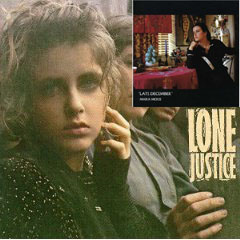
“East of Eden,” Lone Justice (download)
“No Other Way to Love You,” Maria McKee (download)

A sleeper album that begs for a re-listen 20-something years later. I was one of the few who bought Lone Justice after seeing “Ways to be Wicked” on MTV, and really loved the country rock (with an emphasis on rock) vibe the band was groovin’ on. “East of Eden” had that ever so popular Bo Diddley beat underneath and Maria McKee’s helium vocals that provided the right amount of counterpoint to raw sounding guitars. Flash forward to the semi-present and what has become of Maria? Well, her voice is a lot lower, it has a operatic quality to it, and her songwriting is less “pop” and more sprawling. If you’re looking for Lone Justice redux, you ain’t gonna find it on “No Other Way to Love You.”
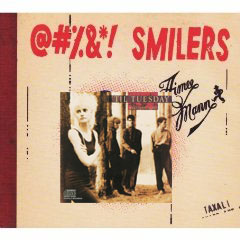
“On Sunday,” ‘Til Tuesday (download)
“Thirty One Today,” Aimee Mann (download)
Okay, here’s where I cheated. This is actually from ‘Til Tuesday’s second album, Welcome Home, but to me it’s the album where they really gelled as a band. The songwriting was even more forlorn than their debut album, Aimee’s singing was more confident, and the arrangements were more mature. Damn shame the band broke up! With Aimee’s solo work, the tempo of each album became slower and slower, and the songwriting reached its nadir with The Forgotten Arm. By the time @#%*&! Smilers came out, I had pretty much given up on her. And while I found this album to be kinda sorta good, I rarely listen to it — save, perhaps, for this track. I think “Thirty One Today” is classic Mann, and if she could find her misery muse that inspired her to write great songs like she did on Welcome Home, I think her solo output would be less hit or miss.
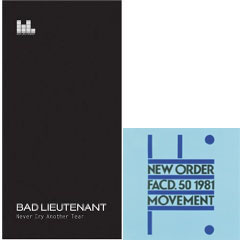
“Dreams Never End,” New Order (download)
“Dynamo,” Bad Lieutenant (download)
I love New Order, and was saddened by the breakup of such an influential new wave band. Listening to their debut album, it’s clear they hadn’t completely exorcised the ghost of Ian Curtis, nor had they jettisoned their Joy Division sound. How could they? It’s was only roughly a year after Curtis’ suicide that they reformed as New Order. You can clearly hear the Joy Division sound on the lead track to their debut album, Movement, but there’s also that unmistakeably New Order sound lurking in there as well. Now that Bernard Sumner and Peter Hook hate each other, what to do? Well, you take a name from a 1992 movie staring Harvey Keitel and fuse it with some hooks from the Who’s “Won’t Get Fooled Again,” and you have the curious case of a Peter Hook-less “Dynamo” by Bad Lieutenant.
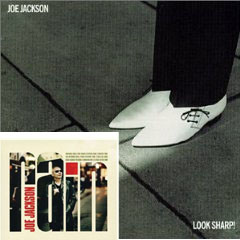
“Got The Time,” Joe Jackson (download)
“Invisible Man,” Joe Jackson (download)
Listening to these albums as bookends makes for an interesting career comparison. Look Sharp had a very snotty pop/punk thing going on (which did nothing to foreshadow the artiste Jackson would later display from the mid ’80s onward), the band was tight, the songs certainly reflected a late ’70s/early ’80s post-punk Brit working class thuggishness, and yeah, the album contains the (now) classic “Is She Really Going Out With Him.” However, what’s really fun when comparing these albums is the fact that the original band who backed Joe on Look Sharp is the same one on Rain — with Gary Sanford missing in action. David Houghton’s drumming is tasteful and mature, Graham Maby’s bass playing is fluid but understated, and Joe’s piano playing is in top form. It’s a shame “Invisible Man” induces nothing but a shrug from me.
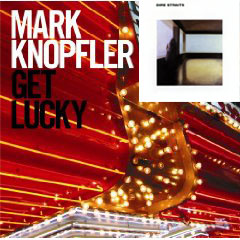
“Down to the Waterline,” Dire Straits (download)
“Piper to the End,” Mark Knopfler (download)
Dire Straits makes my personal top three bands of all time. I don’t know what it was about Dire Straits’ music that made me connect with this band, but it wasn’t their eponymous debut album. Don’t get me wrong, I do like this album … a lot. However, the production is kind thin and compressed, and the songwriting misses the mark at times, but there’s no denying the talent of a (then) young Mark Knopfler on guitar. “Sultans of Swing” certainly brought that fact home, but Knopfler’s playing on “Down to the Waterline” is equally as blistering. And now here we are 31 years later and Knopfler’s playing has less flash, but his voice has greater clarity. Some could point to a song like “Piper to the End” as evidence that Knopfler is fading away into a laconic haze of Celtic dirges, but to me this song reminds me of the inspired work he did on the Local Hero soundtrack.




Comments